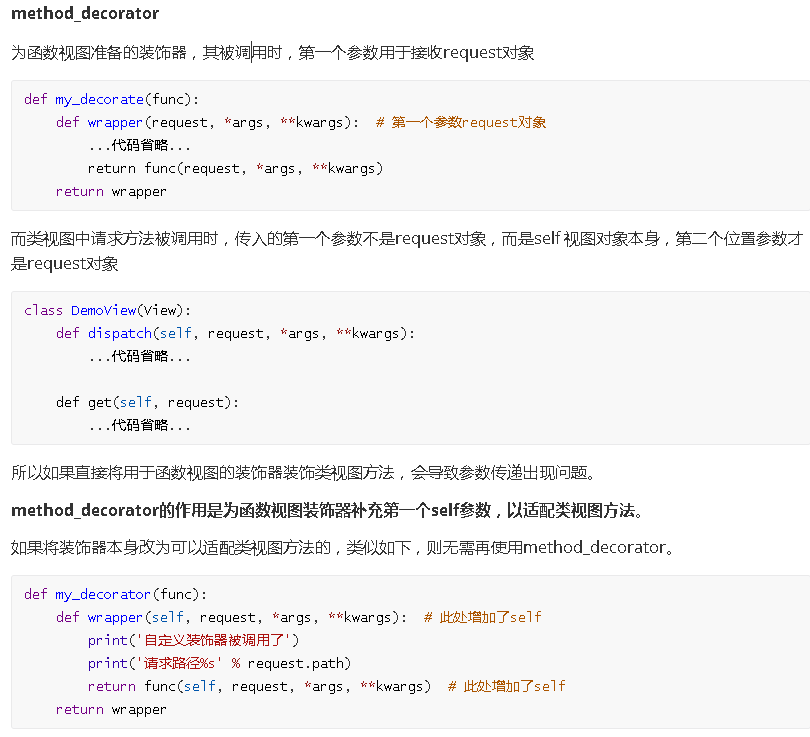视图
函数视图[Function Base View]
以函数的方式定义的视图称为函数视图
def register(request): """处理注册""" # 获取请求方法,判断是GET/POST请求 if request.method == 'GET': # 处理GET请求,返回注册页面 return render(request, 'register.html') else: # 处理POST请求,实现注册逻辑 return HttpResponse('这里实现注册逻辑')
类视图[Class Base View]
在Django中也可以使用类来定义一个视图,称为类视图。
""" # django的类视图一共提供了多个以http请求方法命名的类方法给我们使用。 # 当客户端使用不同的http请求方法访问当前视图类,django会根据请求方法访问到当前类视图中的同名对象方法中。 # http常用请求方法 # GET 客户端向服务端请求读取数据 # POST 客户端向服务器请求创建数据 # PUT 客户端向服务器请求修改数据[全部] # PATCH 客户端向服务器请求修改数据[修改部分数据] # DELETE 客户端向服务器请求删除数据 """ from django.views import View from django.http.response import HttpResponse class UserView(View): def post(self,request): print("客户端进行post请求") return HttpResponse("post") def get(self,request): print("客户端进行get请求") return HttpResponse("get") def put(self,request): print("客户端进行put请求") return HttpResponse("put") def delete(self,request): print("客户端进行delete请求") return HttpResponse("delete")
类视图的好处:
-
代码可读性好
-
类视图相对于函数视图有更高的复用性, 如果其他地方需要用到某个类视图的某个特定逻辑,直接继承该类视图即可
类视图使用
定义类视图需要继承自Django提供的父类View,可使用from django.views.generic import View或者from django.views.generic.base import View 导入,定义方式如上所示。
配置路由时,使用类视图的as_view()方法来添加
from django.urls import path from . import views urlpatterns = [ path("cls/", views.UserView.as_view() ), ]

class View:######源码分析:类视图调用关系 1、 path("cls/", views.UserView.as_view() ), UserView继承了View类 并调用View的类方法as_view """ Intentionally simple parent class for all views. Only implements dispatch-by-method and simple sanity checking. """ http_method_names = ['get', 'post', 'put', 'patch', 'delete', 'head', 'options', 'trace'] def __init__(self, **kwargs): """ Constructor. Called in the URLconf; can contain helpful extra keyword arguments, and other things. """ # Go through keyword arguments, and either save their values to our # instance, or raise an error. for key, value in kwargs.items(): setattr(self, key, value) @classonlymethod def as_view(cls, **initkwargs): """Main entry point for a request-response process.""" for key in initkwargs: if key in cls.http_method_names: raise TypeError("You tried to pass in the %s method name as a " "keyword argument to %s(). Don't do that." % (key, cls.__name__)) if not hasattr(cls, key): raise TypeError("%s() received an invalid keyword %r. as_view " "only accepts arguments that are already " "attributes of the class." % (cls.__name__, key)) def view(request, *args, **kwargs): self = cls(**initkwargs) if hasattr(self, 'get') and not hasattr(self, 'head'): self.head = self.get self.setup(request, *args, **kwargs) if not hasattr(self, 'request'): raise AttributeError( "%s instance has no 'request' attribute. Did you override " "setup() and forget to call super()?" % cls.__name__ ) return self.dispatch(request, *args, **kwargs)######3、view函数中调用了类方法 dispatch view.view_class = cls view.view_initkwargs = initkwargs # take name and docstring from class update_wrapper(view, cls, updated=()) # and possible attributes set by decorators # like csrf_exempt from dispatch update_wrapper(view, cls.dispatch, assigned=()) return view ####### 2、执行as_view函数时返回view函数变量 def setup(self, request, *args, **kwargs): """Initialize attributes shared by all view methods.""" self.request = request self.args = args self.kwargs = kwargs def dispatch(self, request, *args, **kwargs):##############相当于路由分发 # Try to dispatch to the right method; if a method doesn't exist, # defer to the error handler. Also defer to the error handler if the # request method isn't on the approved list. if request.method.lower() in self.http_method_names: handler = getattr(self, request.method.lower(), self.http_method_not_allowed) else: handler = self.http_method_not_allowed return handler(request, *args, **kwargs)######4、 判断UserView类中是否有 请求方式的例如:POST GET 等请求 request.method.lower() 变成小写 有着返回该类方法的执行结果 def http_method_not_allowed(self, request, *args, **kwargs): logger.warning( 'Method Not Allowed (%s): %s', request.method, request.path, extra={'status_code': 405, 'request': request} ) return HttpResponseNotAllowed(self._allowed_methods()) def options(self, request, *args, **kwargs): """Handle responding to requests for the OPTIONS HTTP verb.""" response = HttpResponse() response['Allow'] = ', '.join(self._allowed_methods()) response['Content-Length'] = '0' return response def _allowed_methods(self): return [m.upper() for m in self.http_method_names if hasattr(self, m)]
类视图使用装饰器
为类视图添加装饰器,可以使用三种方法。
为了理解方便,我们先来定义一个为函数视图准备的装饰器

from django.shortcuts import render # Create your views here. from django.views import View from django.http.response import HttpResponse ####普通的装饰器调用 def my_decorator(func): def wrapper(request, *args, **kwargs): print('自定义装饰器被调用了') print('请求路径%s' % request.path) return func(request, *args, **kwargs) return wrapper @my_decorator def decoratordemo(request): return HttpResponse("函数视图") """不能直接在类视图的方法中直接使用装饰器,会出现参数位置的错误,会多传递一个self当前对象给装饰器,从而导致错误""" # class UAPI(View): # @my_decorator # def get(self,request): # return HttpResponse("类视图使用装饰器") class UAPI2(View): def get(self,request): return HttpResponse("类视图使用装饰器")

from django.contrib import admin from django.urls import path from app01 import views urlpatterns = [ path('admin/', admin.site.urls), # path("cls/", views.UserView.as_view() ), path("fbv/", views.decoratordemo), path("cbv2/", views.my_decorator(views.UAPI2.as_view())), # 在路由中使用装饰器不好!不好维护,不易理解 ]


def my_decorator(func): def wrapper(self,request, *args, **kwargs): print('自定义装饰器被调用了') print('请求路径%s' % request.path) return func(self,request, *args, **kwargs) return wrapper # @my_decorator # def decoratordemo(request): # return HttpResponse("函数视图") """不能直接在类视图的方法中直接使用装饰器,会出现参数位置的错误,会多传递一个self当前对象给装饰器,从而导致错误""" class UAPI(View): @my_decorator def get(self,request): return HttpResponse("类视图使用装饰器")
method_decorator装饰器还支持使用name参数指明被装饰的方法
方式二:

from django.shortcuts import render # Create your views here. from django.views import View from django.http.response import HttpResponse ####普通的装饰器调用 def my_decorator(func): def wrapper(request, *args, **kwargs): print('自定义装饰器被调用了') print('请求路径%s' % request.path) return func(request, *args, **kwargs) return wrapper """要装饰类方法,可以使用django.utils.decorators.method_decorator装饰器来装饰""" from django.utils.decorators import method_decorator #初版本 # class UAPI3(View): # @method_decorator(my_decorator) # def get(self,request): # return HttpResponse("类视图get方法使用装饰器") # # @method_decorator(my_decorator) # def post(self,request): # return HttpResponse("类视图post方法使用装饰器") #升级版本 # 在开发中,一般不建议在类中的方法上面添加装饰器,而是建议写在类的前面 # @method_decorator(my_decorator,name="get") # @method_decorator(my_decorator,name="post") # class UAPI3(View): # def get(self,request): # return HttpResponse("类视图get方法使用装饰器") # # def post(self,request): # return HttpResponse("类视图post方法使用装饰器") #升级版本 """如果同一个类中所有方法公用一个装饰器,把装饰器添加到dispatch中,因为类视图中任意一个方法都会执行到as_view,as_view里面必然调用了当前对象的dispatch""" @method_decorator(my_decorator,name="dispatch") class UAPI3(View): def get(self,request): return HttpResponse("类视图get方法使用装饰器") def post(self,request): return HttpResponse("类视图post方法使用装饰器")

from django.contrib import admin from django.urls import path from app01 import views urlpatterns = [ path('admin/', admin.site.urls), path("cbv3/", views.UAPI3.as_view()), ]
方式三:

from django.shortcuts import render # Create your views here. from django.views import View from django.http.response import HttpResponse ####普通的装饰器调用 def my_decorator(func): def wrapper(request, *args, **kwargs): print('自定义装饰器被调用了') print('请求路径%s' % request.path) return func(request, *args, **kwargs) return wrapper """要装饰类方法,可以使用django.utils.decorators.method_decorator装饰器来装饰""" from django.utils.decorators import method_decorator """在多个类视图中如果要公用代码,可以使用多继承[Mixin扩展类]""" @method_decorator(my_decorator,name='dispatch') class BaseView(View): pass class UAPI4(BaseView): def get(self,request): return HttpResponse("类视图4get方法使用装饰器") def post(self,request): return HttpResponse("类视图4post方法使用装饰器") class MyDecoratorMixin(object): @classmethod def as_view(cls, *args, **kwargs): print( super() ) # View view = super().as_view(*args, **kwargs) # 进行装饰 view = my_decorator(view) return view class DemoView(MyDecoratorMixin, View): def get(self, request): print('get方法') return HttpResponse('getok') def post(self, request): print('post方法') return HttpResponse('postok')

from django.contrib import admin from django.urls import path from app01 import views urlpatterns = [ path('admin/', admin.site.urls), path("cbv4/", views.UAPI4.as_view()), path("cbv5/", views.DemoView.as_view()), ]
